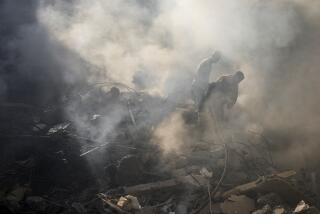4 Hurt in Blasts at Iraq Compound
- Share via
BAGHDAD — Three explosions rocked the heavily fortified presidential palace compound Tuesday night where many U.S. officials live and work, wounding four people in the second such attack on the complex in the Iraqi capital in 10 days.
Capt. David Romley of the Pentagon said the blasts probably were caused by mortar rounds launched into the compound. He said it was not known whether the injured were soldiers or civilians. It was not immediately clear whether any were Americans.
On Oct. 26, insurgents fired projectiles into the 1-square-mile compound, hitting the Rashid Hotel, which is home to many U.S. troops and civilian officials in the U.S.-led occupation administration. That attack, carried out with at least eight rockets, killed one person and wounded seven.
In other violence Tuesday, two more coalition troops were reported slain. In Baghdad, one U.S. soldier died and two were injured by a roadside bomb. The military said all were from the 1st Armored Division, but their names were withheld pending notification of their families. In southern Iraq, British officials said Cpl. Ian Plank, 31, was killed Friday by hostile fire.
The continuing danger is prompting Spain, a close U.S. ally that has contributed more than 1,000 troops to the coalition forces in Iraq, to withdraw most of its diplomatic staff from Baghdad.
Spanish Foreign Minister Ana Palacio said Tuesday that 25 of her nation’s 29-member diplomatic staff will be pulled from the Iraqi capital, with most relocating to neighboring Jordan. “We have taken staff out of Baghdad temporarily given that it is a very complicated moment,” Palacio said in Berlin, Associated Press reported.
Spaniards working for the U.S.-led Coalition Provisional Authority will stay, the Spanish Defense Ministry said, but did not say how many.
President Bush on Tuesday reiterated his pledge to go after those attacking coalition troops and civilians in Iraq.
“We will continue to find the terrorists and bring them to justice. These people want to -- ‘these people’ being the terrorists and those who would kill innocent life -- want us to retreat, they want us to leave, because they know that a free and peaceful Iraq in their midst will damage their cause,” Bush said Tuesday while touring damage from the wildfires in San Diego County. The United States, he added, will “stay the course.”
Mortar attacks have become increasingly common in Iraq. They are a particularly advantageous weapon to an enemy using guerrilla tactics because they can be fired a long way from their targets, giving assailants time to escape.
A Defense Department official said a U.S.-made 81-millimeter mortar round -- which weighs about 50 pounds and is similar those used by the Iraqi military and now by insurgents -- can travel more than three miles.
An investigation of Tuesday’s incident was already underway, officials said. Typically, the U.S. deploys a quick-reaction force to try to find the culprits or at least some evidence.
“If you’re lucky, you can figure out who did it, or at least what type of weapon system they used. Sometimes they don’t have time to take the weapon system with them, and they leave a mortar tube behind,” the official said.
The official acknowledged, however, that mortar attacks are “difficult to defend against” because of the weapons’ range. “Three miles is pretty far.”
Generally, insurgent mortar attacks have not been very accurate, although one attack in August on the U.S.-protected Abu Ghraib prison west of Baghdad killed six Iraqis and wounded nearly 60 others.
In addition to mortar attacks, assassinations of public figures are a growing concern. A judge was killed Tuesday in the northern city of Mosul. The slaying of Ismail Youssef came a day after a judge in the southern city of Najaf was abducted and killed.
The Najaf jurist, Muhan Jabr Shuwaili, helped establish a judicial commission to investigate former officials of President Saddam Hussein’s ousted regime.
Amid the violence, Jalal Talabani, chairman of Iraq’s Governing Council, wrote a letter to the U.S. government on behalf of the council’s 24 members extending their condolences and condemning the “terrorist attacks” that brought down a U.S. helicopter Sunday in Iraq, killing 15 soldiers.
“The attacks are obvious proof of the disappointment and frustration” of the anti-American forces because of Iraq’s “development and accomplishments,” the letter said.
However, the letter went on to urge the U.S.-led occupation administration to turn over more of the responsibility for the country’s security to the Governing Council.
“We believe Iraqis are more capable to deal with this ... than others, since they are well acquainted with the current state of affairs in Iraq and very aware of the ... nature of their people,” the letter said.
Bush said Tuesday that the U.S. is moving to hand more authority to Iraqis. “We have now stood up over 70,000 Iraqi citizens to be police, border patrol and beginnings of the military, so that Iraqis will be able to run their own country,” he said. “That has been our mission all along, to develop the conditions such that a free Iraq will emerge, run by the Iraqi citizens.”
More to Read
Sign up for Essential California
The most important California stories and recommendations in your inbox every morning.
You may occasionally receive promotional content from the Los Angeles Times.













